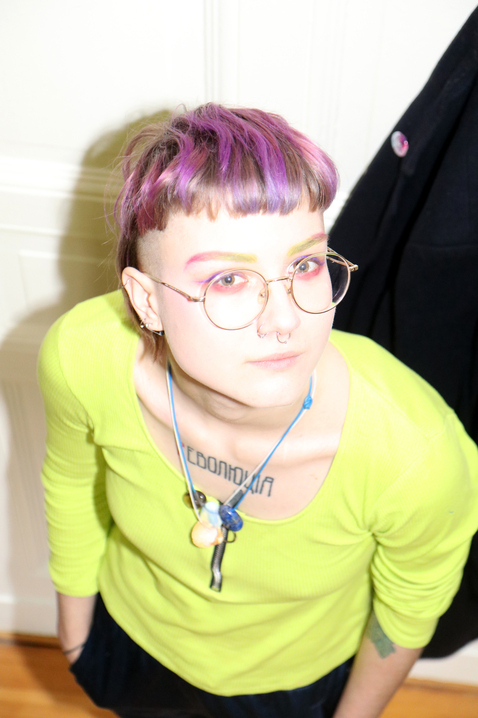Klem / Anton Shebetko, Ukraine
“I came out in front of my parents as a bisexual person at the age of 13, and they accepted it very well. My father was especially supportive of me. In 2020, I married my wonderful wife in Germany and they came to meet us. They take great care of me and ask how we are doing.
In my opinion, there are positive developments in Ukraine regarding the rights of the LGBTQ+ community. More people come to marches, and it becomes a topic for discussion in society. Especially now, the coverage of the presence of community representatives at the front plays an important role in this. It seems to me that when we win, it will be a very important moment to show that we exist: we are all over the world and in Ukraine too. We did everything both possible and impossible for our victory, because queer people serve in the Armed Forces, volunteer, hold rallies and rallies around the world and here in Berlin, take to the streets and try to influence society and politicians to help Ukraine. I believe that such representation is also very important, because after the victory, everyone will have a question: what did you do during the war? Talking about it is also part of the story.
Many Germans want to help, but for some reason they buy into propaganda about the ‘Nazis in Ukraine’, as if this argument allows them not to support Ukraine. There are some good articles about how Russia sponsored far-right organizations in Ukraine and then used it for its own propaganda. There is a big movement in Germany against nuclear power energy, so it seems to me that they have fallen into the Russian trap very much, and because of this they have increased supplies of Russian gas and oil. This is now a major obstacle to support and many people are affected by this narrative.
As for myself, I very much hope that the German leftist movement will open its eyes and mind a little to help and support Ukraine, because Ukraine is not only Azov, Ukraine is very big. My anarchist friends and friends of other political persuasions have now united to fight the imperialist, aggressive, Russian attack. The sooner people in Germany and around the world understand this, the closer our victory will be.
About war. On February 24, I was in the woods in Germany with my anarchist friends. At 8 am in February, I open my phone and the first message I saw was a message from my father saying that the war had begun.
We were in this forest, and while my sister was driving from Kyiv to the Polish border for three days, I spent those three days on the phone.
In 2014, when the war broke out, my sister and I lived in Simferopol. My sister and I went to school in the center of the city; the Simferopol administration was nearby, so we were not allowed to go to school for some time. When the occupation began, no one fully understood what was happening. As soon as the “green men” came and the Russian flags appeared, it became clearer. From the very beginning, we were more focused on Ukraine.
When the occupation took place, my sister and I were 14 years old and we were trying to do something. We created a group ‘Crimea is Ukraine’. There were 5 teenage organizers, and we had the idea to organize some rallies. It all ended with the FSB coming to one of the girls’ homes and threatening them. I had been speaking Ukrainian all that year and I was very pressured by the class teacher at school. Later, I had to change schools, and a year later we left.
I am now worried about my acquaintances and relatives who are under occupation. They can’t leave; they planned to, but didn’t have time. They do not go to rallies because it is dangerous, and there is no real opportunity. However, their friends know about their position, and they do not communicate with non-pro-Ukrainian friends.
In 2019, I had to move to Germany. Due to an anti-harassment process, and pressure put on me as an affected person, I decided to quit university and leave. But my sister stayed in Kyiv and graduated.
If we talk about identification, my political activity as a Ukrainian anarchist involved self-awareness as a queer person. In 2014, in Crimea, I realized that if I do not do something – somehow show my position – then no one will do it for me. This became noticeable and clear to me during the Russian aggression and occupation. Self-awareness helped me to decide politically and to become more active.
These events have left a very big mark on me and my family. When your roots, your home, and what you identify with are taken away from you, and you can’t go back there, it hurts. Until 2019, while I lived in Ukraine, I went to my parents in Crimea and it was a very traumatic experience: to see everything that you remember, and to understand that you can’t come back, you can’t work and live there.”




